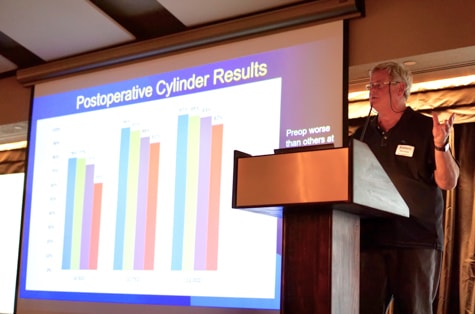Wolfe Foundation

Wolfe Eye Clinic has operated with compassion for those in need for more than 100 years. It’s that mission that inspired visionary eye doctor Otis R. Wolfe, who founded the clinic in 1919, to create the Wolfe Foundation in 1936.
Our mission today is as simple and powerful as it was when established:
It is estimated that half of all blindness could be prevented with access to timely evaluation and treatment. New technology and drug therapies have made treating these age-related diseases more successful. However, the increasing costs associated with these treatments many times put them out of reach for uninsured or under-insured individuals.
Wolfe Foundation, thanks to its dedicated and passionate donors, fills that essential need with treatments including glaucoma, retina disease and cornea disease in addition to helping patients in need with glasses and eye expenses.
How does Wolfe Foundation Work?
Wolfe Foundation’s mission is two-fold: provide assistance to those facing loss of sight who otherwise could not afford treatment and support ophthalmic education and research. In order to touch even more lives, Wolfe Eye Clinic physicians partner with the Foundation to donate their surgical time and other professional services. More than 95% of investments from compassionate donors go directly to this mission —75% for patient care, 20% to education and research.
“The Foundation helps individuals who don’t have insurance and can’t afford to have surgery,” Kevin Swartz, Wolfe Eye Clinic CEO said. “Wolfe surgeons donate their time as surgeons and the Foundation helps pay the hospital for some cases. Those are amazing opportunities that we have at Wolfe Clinic to additionally help people that otherwise would have a hard time achieving.”
How do I apply for assistance from Wolfe Foundation?
Thousands of people are struggling with their vision. You are not alone. If you need help with your vision or eye disease and do not have the funds to pay for your vision-related care, please apply for assistance. You may contact Amy Damman at adamman@wolfeclinic.com or give us a call at (833) 474-5850. Each application is considered with the upmost care.
How can I help support or donate to Wolfe Foundation?
Most of the information we receive and much of how we experience life is through our eyes. Sight is fundamental to our well-being and while it is often taken for granted, vision helps our communities thrive. When eye disease threatens this vital sense and our way of life, individuals and their loved ones and communities feel the impact.
It is generous donations from people like you, that allow Wolfe Foundation to help save vision in patients who otherwise may lose their ability to see. Nearly 90% of all applicants qualify to receive assistance from Wolfe Foundation. Together, we can make a difference.
If you would like to donate, please contact Amy Damman at adamman@wolfeclinic.com or give us a call at (833) 474-5850. Wolfe Foundation is a 501(c)(3) non-profit organization. Your contribution to Wolfe Foundation is tax-deductible to the extent permitted by law.
How did Wolfe Foundation start?
Established in 1936 by Wolfe Eye Clinic’s founder, Otis R. Wolfe, Wolfe Foundation was originally known as Wolfe Cataract Foundation. This was a time when Wolfe Eye Clinic was establishing itself as a national leader in ophthalmology. Similar to modern day, the Wolfe Foundation then provided assistance and care for those facing loss of sight and simply could not afford the cost of treatment. Dr. Wolfe himself would often donate his time for those whom didn’t have the funds or government assistance to pay for important eye procedures.
The initial funding source for the Foundation was Wolfe’s farmland in Kansas. He donated acreages to the upstart nonprofit in order to achieve a positive mission. In the first few decades of the Foundation — a time when Medicaid wasn’t available — many of Wolfe’s Foundation patients were farm laborers. Many may not have had the means of traveling to the University of Iowa, where medical students often performed procedures at lower costs.
Medicaid was created in 1965, providing health insurance for some low-income patients, primarily children. But there was and continues to be a need among uninsured, working, low-income adults, immigrant populations and other underserved groups of people. Improved eyesight can change the course of someone’s life, helping to make them more employable and actually benefit local communities.
While funding structures have evolved, Wolfe Foundation stays true to its mission and continues to help thousands of patients.
Supporting Ophthalmic Education and Research
Throughout Wolfe Foundation’s history, advancing the field of ophthalmology has been an important mission of the Foundation. As such, 20% of Wolfe Foundation funds are allocated to support ophthalmic education and research. In particular, Wolfe Foundation contributed to education by funding an endowed lecture series for ophthalmologists across the Midwest hosted at the University of Iowa College of Medicine’s Department of Ophthalmology and Visual Sciences.
 Starting in 1969, the Wolfe Foundation Lecture has been delivered nearly annually by some of the most distinguished ophthalmologists in the world. It has become one of the most prestigious ophthalmic lectureships and a cornerstone of the education program of the Department of Ophthalmology and Visual Sciences. Two physicians from Wolfe Eye Clinic have given lectures as a part of the series: Dr. John Graether (2004) and Dr. James Davison (2009), both revolutionary ophthalmologists.
Starting in 1969, the Wolfe Foundation Lecture has been delivered nearly annually by some of the most distinguished ophthalmologists in the world. It has become one of the most prestigious ophthalmic lectureships and a cornerstone of the education program of the Department of Ophthalmology and Visual Sciences. Two physicians from Wolfe Eye Clinic have given lectures as a part of the series: Dr. John Graether (2004) and Dr. James Davison (2009), both revolutionary ophthalmologists.
In the 1970s and ‘80s, funds from Wolfe Foundation helped Wolfe Eye Clinic conduct important research to advance the field of ophthalmology. But with a change in tax law which precluded funding of its own research, the Wolfe Foundation has instead donated money to outside ophthalmic research organizations to continue innovation in the field, such as Iowa Society to Prevent Blindness and the American Diabetes Associations.
Funds are also provided for supplies on medical mission trips often when Wolfe Eye Clinic physicians to travel to underdeveloped nations to assist patients in need. For example, recently Dr. Ryan Vincent traveled to Jamaica to provide cataract surgery and glaucoma surgery to local residents in need. Dr. Vincent helped reduce the local surgery wait list by six months!